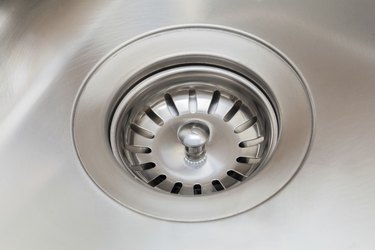
If your sink drain is functioning properly, a pool of water in the P-trap blocks sewer odors from wafting into the kitchen, so if you're detecting musty smells under your kitchen sink or in the drain, they are probably coming from the top of the drain. That isn't unusual, because food tends to collect there and decompose, especially if you have a garbage disposal. Moreover, mold thrives on the moisture inside a drain. You can knock out both with simple treatments and correct a kitchen sink that smells like dirt or must.
Causes of a Smelly Kitchen Drain
Video of the Day
The main causes of a smelly kitchen drain are mold, decomposing food, and water sulfates in the water. Though giving your kitchen sink a good scrubbing is a good first course of action, you can't be guaranteed that will eliminate the actual source of the smell.
Video of the Day
While the top of your drain strainer may look clean, you might be surprised at what you find if you turn it over. Mold spores are virtually everywhere, and they readily grow in the moist environment inside your drain, which includes the straight length of pipe called the tailpiece that extends down to the P-trap. Decomposing food can also collect there, especially if you put in stringy materials, such as celery fibers, which catch other waste and allow it to collect. A third possible cause of a musty smell in the drain is sulfates in the water, which may originate in your hot water heater.
How to Disinfect a Musty Drain
The best methods of disinfecting a musty drain are good old fashioned baking soda and vinegar. A number of disinfecting products can rid your drain of odors, and while bleach is one of them, you should avoid it if you're in the habit of pouring other cleaning solutions into the sink. It releases poisonous gas when combined with ammonia, which is a common cleaning ingredient.
Here's how to disinfect a musty drain:
- Scrub both sides of the strainer with a paste made with baking soda and water.
- Then, pour boiling water into the drain followed by 1/2 cup of baking soda.
- Flush the drain after 10 minutes with more water.
- Alternatively, pour vinegar and baking soda into the drain at the same time and let the resulting foaming action do the cleaning and disinfecting.
How to Eliminate a Musty Smell from Garbage Disposals
- To eliminate mold in your garbage disposal, fill the disposal with ice and a half-cup of kosher salt and run them through to scrub the inner part of the canister.
- Cut up two or three lemons and run them through the disposal. Lemons are full of citric acid, which is as effective a cleaner and disinfectant as the acetic acid in vinegar. As the disposal pulverizes the peels, small particles will cling to the rotors and provide continued disinfecting power until they wash off.
- Sprinkle some baking soda into the disposal along with the lemons for added deodorizing.
Tip
Often the worst disposal smells come from crud that's collected on the rubber baffle that shrouds the drain opening. Clean the underside of the baffle with dish soap and an old dish brush or sponge (you'll probably want to toss it when you're done).
How to Eliminate Odor-Causing Bacteria in the Water Heater
Sulfur-reducing bacteria can give your tap water a rotten-egg smell, and they often grow in the water heater. The remedy is simple: Turn the water heater temperature to "high" for several hours to kill them. Don't forget to turn the temperature back down again, and use caution when running the hot water, which may get scalding hot.
Run the hot water in several sinks before you adjust the temperature. You should also test the cold water, and if you find the same odors, you may have to disinfect your pressure tank or filter water if you have a well. If you're on a municipal water system, report the problem to the water authorities.